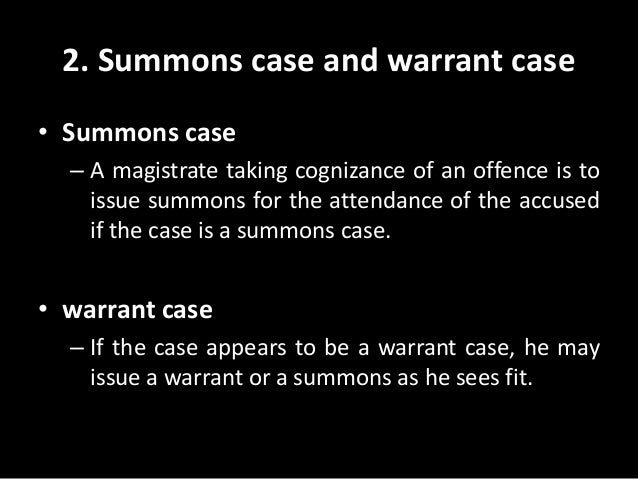A warrant-case is defined to mean a case relating to an offence punishable with death, imprisonment for life or imprisonment for a term exceeding two years. A summons-case means a case relating to an offence, not being a warrant-case.
The code classifies all offences into cognizable and non-cognizable, and the trial procedure into summons-cases and warrant-cases. This division is based on the nature and measure of punishment attached to the offence.
It is to be noted that this distinction is distinct and different from the question whether a summons or a warrant would issue in the first instance and whether an offence is cognizable or not.
ADVERTISEMENTS:
Thus, a warrant-case is one which is punishable —
(a) With death sentence, or
(b) A sentence of life-imprisonment, or
ADVERTISEMENTS:
(c) A sentence of imprisonment exceeding two years.
All other cases, (i.e., those which are not warrant-cases) are summons-cases.
The procedure for trial of warrant-cases is contained in Chapter XIX of the Code, whereas that for the trial of summons-case is to be found in Chapter XX. The two procedures differ in several respects, and the following are the eight points of difference between the two:
(i) In a warrant-case, a charge is to be framed against the accused. In a summons-case, no charge need be framed; only the particulars of the offence of which he is accused must be conveyed to him.
ADVERTISEMENTS:
(ii) In a warrant-case, after the charge is framed, the accused may plead guilty, and the Magistrate may, in his discretion, convict him. (S. 241) In a summons-case, if the accused pleads guilty, the Magistrate must record the plea of the accused, and may, in his discretion, convict him on such plea. (S. 252)
(iii) In a warrant-case, a Magistrate can discharge the accused —
(a) If the complainant is absent; or
(b) If no charge is framed; or
(c) If the offence is compoundable and non-cognizable. In a summons-case, the accused may be acquitted —
(a) If the complainant does not appear; or
(b) On the death of the complainant.
(iv) In a warrant-case, the complainant may, with the consent of the Court, withdraw the remaining charges against an accused, if he is charged with several offences and convicted on one or more of them. In a summons-case, the complainant may, with the permission of the Magistrate, withdraw his complaint against the accused.
(v) A warrant-case cannot be converted into a summons-case in the course of the trial. However, a summons-case can be converted into a warrant-case.
(vi) When the charges reveal both a warrant-case and a summons- case, a warrant-case is to be preferred.
(vii) A charge under a warrant-case cannot be split up into its constituents for trial under a summons -case.
(viii) A Warrant-case comes into the picture when the offence is punishable with death or imprisonment for life, or imprisonment for more than two years. All other cases are summons-cases. This distinction holds good irrespective of the question whether summons was issued in the case, or the accused could be arrested without a warrant.
